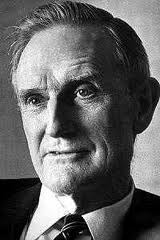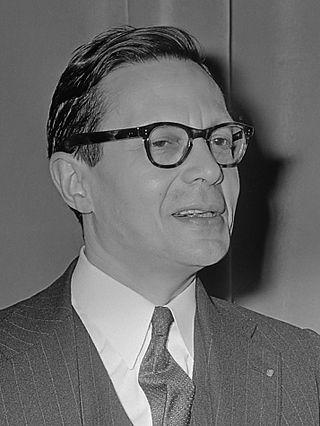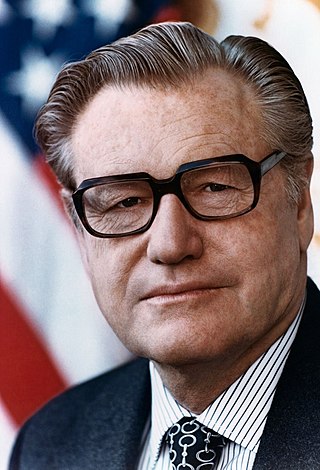Related Research Articles

The Trilateral Commission is a nongovernmental international organization aimed at fostering closer cooperation between Japan, Western Europe and North America. It was founded in July 1973, principally by American banker and philanthropist David Rockefeller, an internationalist who sought to address the challenges posed by the growing economic and political interdependence between the U.S. and its allies in North America, Western Europe, and Japan. The leadership of the organization has since focused on returning to "our roots as a group of countries sharing common values and a commitment to the rule of law, open economies and societies, and democratic principles".

Clarence Douglas Dillon was an American diplomat and politician, who served as U.S. Ambassador to France (1953–1957) and as the 57th Secretary of the Treasury (1961–1965). He was also a member of the Executive Committee of the National Security Council (ExComm) during the Cuban Missile Crisis. His conservative economic policies while Secretary of the Treasury were designed to protect the U.S. dollar.

Winthrop Rockefeller was an American politician and philanthropist. Rockefeller was the fourth son and fifth child of American financier John D. Rockefeller Jr. and Abby Aldrich Rockefeller. He was one of the grandchildren of Standard Oil co-founder John D. Rockefeller. As an entrepreneur in Arkansas, he financed many local projects, including a number of new medical clinics in poorer areas, before being elected state governor in 1966, as the first Republican governor of Arkansas since Reconstruction. Despite accusations of lacking insight into the concerns of low-income voters, Rockefeller was re-elected in 1968, and went on to complete the integration of Arkansas schools.

John Davison "Jay" Rockefeller IV is a retired American politician who served as a United States senator from West Virginia (1985–2015). He was first elected to the Senate in 1984, while in office as governor of West Virginia (1977–1985). Rockefeller moved to Emmons, West Virginia, to serve as a VISTA worker in 1964 and was first elected to public office as a member of the West Virginia House of Delegates (1966–1968). Rockefeller was later elected secretary of state of West Virginia (1968–1973) and was president of West Virginia Wesleyan College (1973–1975). He became the state's senior U.S. senator when the long-serving Senator Robert Byrd died in June 2010.

John Davison Rockefeller III was an American philanthropist. Rockefeller was the eldest son and second child of John D. Rockefeller Jr. and Abby Aldrich Rockefeller as well as a grandson of Standard Oil co-founder John D. Rockefeller. He was engaged in a wide range of philanthropic projects, many of which his family had launched, as well as supporting organizations related to East Asian affairs. Rockefeller was also a major supporter of the Population Council, and the committee that created the Lincoln Center in Manhattan.
The Rockefeller family is an American industrial, political, and banking family that owns one of the world's largest fortunes. The fortune was made in the American petroleum industry during the late 19th and early 20th centuries by brothers John D. Rockefeller and William A. Rockefeller Jr., primarily through Standard Oil. The family had a long association with, and control of, Chase Manhattan Bank. By 1987, the Rockefellers were considered one of the most powerful families in American history.

David Rockefeller was an American economist and investment banker who served as chairman and chief executive of Chase Manhattan Corporation. He was the oldest living member of the third generation of the Rockefeller family, and family patriarch from 2004 until his death in 2017. Rockefeller was the fifth son and youngest child of John D. Rockefeller Jr. and Abby Aldrich Rockefeller, and a grandson of John D. Rockefeller and Laura Spelman Rockefeller.

Russell Wilbur Peterson was an American scientist and politician from Wilmington, Delaware. He served as Governor of Delaware as a member of the Republican Party. An influential environmentalist, he served as chairman of the Council on Environmental Quality and president of the National Audubon Society.

Peter Joseph Brennan was an American labor activist and politician who served as United States Secretary of Labor from February 2, 1973, until March 15, 1975, in the administrations of Presidents Nixon and Ford. Brennan had previously been the president of both the Building and Construction Trades Council of Greater New York and the Building and Construction Trades Council of New York, and he returned to the former position after leaving the Ford administration. He was a strong opponent of affirmative action measures to increase the number of minority construction workers. After organizing a demonstration in support of the Nixon administration that turned into the Hard Hat Riot of May 8, 1970, where construction workers violently attacked student anti-war protesters, Brennan was wooed by the Nixon administration as a potential supporter in the 1972 presidential election. His work for Nixon in that election was crucial in increasing the vote for Nixon in New York and in the union movement.

Robert Marjolin was a French economist and politician involved in the formation of the European Economic Community.

Robert Winton Mendenhall is an American educational technologist best known as the president from 1999 to 2016 of Western Governors University (WGU).

Charles Malcolm Wilson was an American politician who served as the 50th governor of New York from December 18, 1973, to December 31, 1974. He was a member of the New York State Assembly from 1939 to 1958. He also served in the Navy during World War II. In 1958, he was elected the lieutenant governor of New York on the gubernatorial ticket with Nelson Rockefeller, and when they won he served as lieutenant governor until succeeding to the governorship after Rockefeller resigned. Wilson lost the 1974 gubernatorial election to Hugh Carey.
The Rockefeller Brothers Fund (RBF) is a philanthropic foundation created and run by members of the Rockefeller family. It was founded in New York City in 1940 as the primary philanthropic vehicle for the five third-generation Rockefeller brothers: John, Nelson, Laurance, Winthrop and David. It is distinct from the Rockefeller Foundation. The Rockefellers are an industrial, political and banking family that made one of the world's largest fortunes in the oil business during the late 19th and early 20th centuries.

Clifton Reginald Wharton Jr. was an American university president, corporate executive and former United States deputy secretary of state. In his multiple careers, he has been an African-American pioneer.
Membership in the Council on Foreign Relations comes in two types: Individual and Corporate. Individual memberships are further subdivided into two types: Life Membership and Term Membership, the latter of which is for a single period of five years and is available to those between the ages of 30 and 36 at the time of their application. Only U.S. citizens and permanent residents who have applied for U.S. citizenship are eligible. A candidate for life membership must be nominated in writing by one Council member and seconded by a minimum of three others.

The University of the Philippines Diliman School of Economics (UPSE) is a degree-granting unit of the University of the Philippines Diliman specializing in the study of economics. Established in 1965, the School of Economics was chosen as the first and only CHED Center for Excellence in Economics in the Philippines in 1999.

Nelson Aldrich Rockefeller, sometimes referred to by his nickname Rocky, was the 41st vice president of the United States, serving from 1974 to 1977 under President Gerald Ford. He had previously served as the 49th governor of New York from 1959 to 1973, the longest-serving governor of the state since the end of the Revolutionary War. Rockefeller was a member of the Republican Party and the wealthy Rockefeller family.

William Reynolds Gianelli was an American engineer and public servant. He was the 3rd United States Assistant Secretary of the Army from 1981 to 1984, serving during the Ronald Reagan administration.

This article lists those who were potential candidates for the Republican nomination for Vice President of the United States in the 1976 election. At the 1976 Republican National Convention, incumbent President Gerald Ford narrowly won the presidential nomination over former California Governor Ronald Reagan. Ford had decided not to choose Vice President Nelson Rockefeller as his running mate, due to Rockefeller's unpopularity with the right wing of the Republican Party. He instead chose Senator Bob Dole of Kansas. Dole was acceptable to the conservative wing of the party, and Ford hoped that Dole would help the ticket win the western states and the agricultural vote. The Ford–Dole ticket ultimately lost to the Carter–Mondale ticket in the general election. Though he would not win the presidential nomination, Reagan announced before the convention that he would pick Senator Richard Schweiker of Pennsylvania as his running mate. Dole went on to become Senate Republican leader, and the Republican presidential nominee in 1996 but ultimately lost to incumbent President Bill Clinton in the general election.

Stephen Berger is an American entrepreneur, investment banker, civil servant and political advisor. His public service positions at the federal, state, and local levels for government agencies include: Chairman of the New York State Commission on Health Care Facilities in the 21st Century, Executive Director of the Port Authority of New York and New Jersey, Chairman of the United States Railway Association under President Jimmy Carter, and executive director of the New York Emergency Control Board for the City of New York.
References
- ↑ "2-Year Study is Projected to Define Critical Choices; Leaders of Government, Education and Industry Compose Rockefeller-Led Group, and the One on Water the Commissions a Rockefeller Proposal First Meeting Held" (PDF). The New York Times.
- ↑ "The Technocratic Tyranny".
- ↑ "Critical Choices for Americans". 1976.